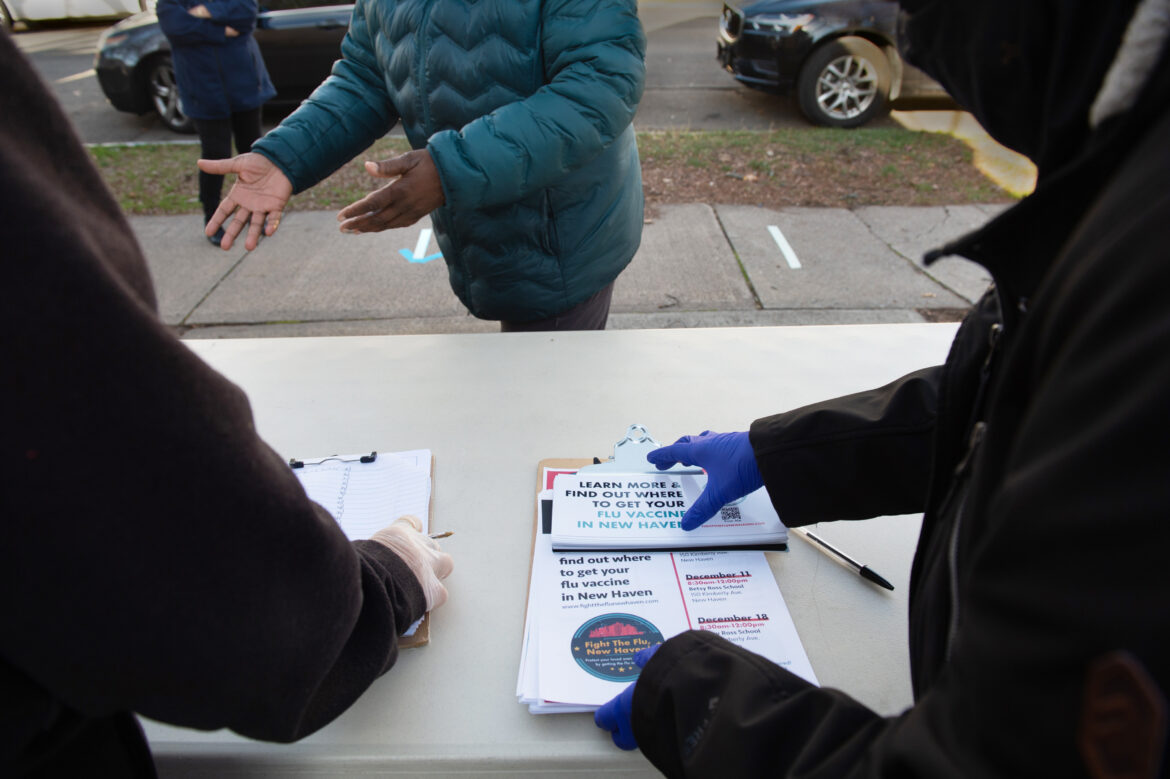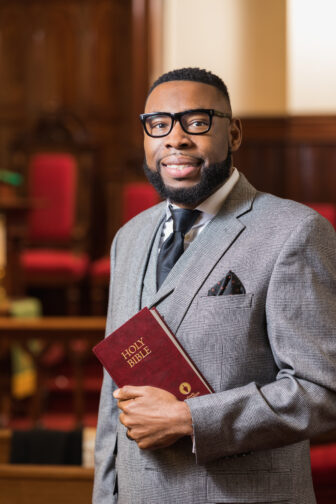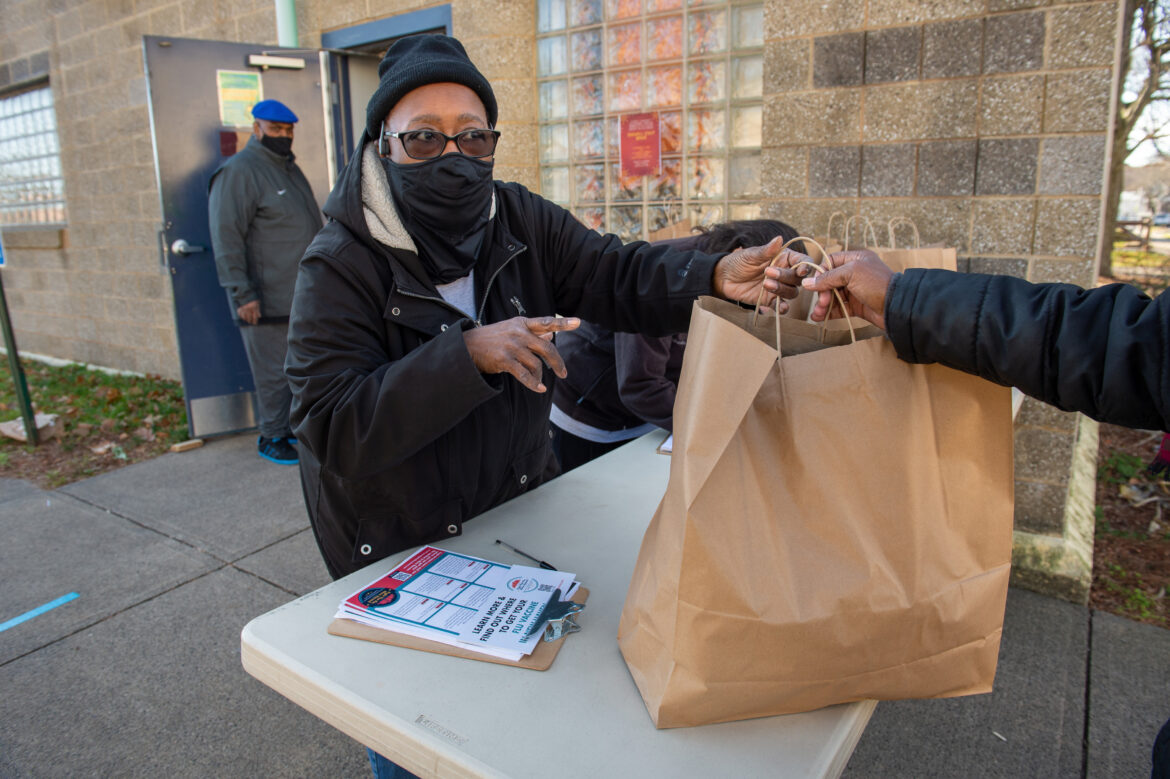On a recent Friday evening, 30 men and women of color in and around New Haven converged on Zoom to share their thoughts about the flu vaccine.
Most were apprehensive. Participants said they worried about contracting the flu from the vaccine, that the danger from the flu vaccine is far greater than catching the flu, and that people of color are again being experimented upon by the medical community. “Our trust levels are really low,” one woman at the online event said. “We think it’s just another way of getting to harm us even further.”
During the 2019-20 flu season in New Haven, more people of color than whites were hospitalized due to the flu: 35% of Black and 31% of Hispanic residents compared to 22% of white people, according to data from the Community Alliance for Research and Engagement (CARE).
CARE received federal funding this September to engage in outreach, like the Zoom meeting, and to deploy its newly hired seven community workers to go into neighborhoods to allay fears about getting a flu shot. The team is visiting food pantries, senior housing, barber shops and beauty salons, among other locations. The initiative also includes a mobile flu vaccine van.
CARE’s efforts come at a critical time. The state is experiencing a second wave of coronavirus cases, hospitalizations and deaths, with New Haven County among the hardest hit. The Centers for Disease Control and Prevention (CDC) reports New Haven County’s seven-day rolling average, from Dec. 5 to Dec. 11, of COVID-related deaths spiked by 30.19% to 69. In Connecticut and nationally, CDC data show that COVID-19 deaths were 2.8 times higher among Black and Hispanic people than white/non-Hispanic people as of Nov. 30.

Cloe Poisson Photo.
Andrea Mastracchio, (right) a volunteer for Women of the Village Food Pantry, asks client Debby Kahan (left) if she has gotten the flu vaccine. Outreach workers are promoting the flu vaccine in several New Haven neighborhoods.
As the first doses of the COVID-19 vaccine arrive this week, the first people being vaccinated are front-line health care workers and nursing home residents. The general population is likely weeks, if not months away from being inoculated.
On the flu front, the state Department of Public Health reported five hospitalizations and one death from Nov. 29 through Dec. 5. While cases of the flu are currently sporadic, this could change.
“This [flu vaccine effort] is particularly important this year to help ease the burden on our health care system during the COVID-19 pandemic,” said Alycia Santilli, director of CARE, which is co-housed at the Yale School of Public Health and Southern Connecticut State University.
“People are understandably skeptical, particularly in communities of color,” said Santilli. “This project has allowed us to train trusted messengers from the community with science-based, factual information about flu vaccinations so that people can make informed decisions for themselves and their families.”
Dr. Leslie Sude of the Yale School of Medicine and its academic multi-specialty practice, Yale Medicine, who is advising the CARE team on the community van initiative, asked, “Why not prevent, to the best we can, influenza with a vaccination?”
Sude is concerned that it could be devastating to have two respiratory illnesses affecting the cardiopulmonary systems as well as the immune systems at the same time. “Both could be quite serious, especially in minority populations where genetically inherited co-morbidities are prevalent,” she said.
Yet, she is sensitive to the fears of the community. “We’ve heard people say they’re worried that we’re sneaking in the COVID virus or the COVID vaccine into the (flu) vaccine,” Sude said.
As of now, CARE has trained an additional 14 volunteers, including local pastors from Black churches, to become “Flu Fighters.” These individuals are also working to allay fears surrounding the COVID-19 vaccine. Plans are underway to meet and train local faith leaders in the Latinx community.
The Rev. Kelcy Steele of the Varick Memorial AME Zion Church in New Haven got a flu shot for the first time in his life this year. “I consider it an act of love for my neighbor and community,” he said.

Cloe Poisson Photo.
Sharon Stevens, director of Women of the Village Food Pantry (right) reaches for a flyer on flu vaccines to give to a client picking up food at the Dixwell neighborhood food pantry.
Now, he’s on Facebook encouraging his 5,000 online friends to get flu shots, too. Elderly church members, with whom he has socially-distanced visits, are particularly distrustful of government health programs, stemming from a decades-long federal study of syphilis that used Black men, without their consent, to monitor the progression of the disease by withholding treatment. “The Tuskegee experiment led to new federal regulations that require transparency and oversight in scientific research,” Steele said.
Still, it’s quite a task to convince his community to trust again.
The Rev. Jackie Williams of Mount Bethel Missionary Baptist Church of New Haven said he almost died of the coronavirus, and is keen for his congregation to get the vaccine.
“We’re not that good as a community that will do preventive maintenance on ourselves,” he said. “We will do preventive maintenance on our cars and houses, but not on us.”
So Williams is calling his congregation members to warn them about what it’s like to be in the ICU with COVID. Members are told to get a flu shot, to exercise, and to not “sit around and eat, eat, eat.”
Williams also informs skeptics that COVID-19 tends to hit them the hardest. “There’s a lot more poor among African Americans that are living in close proximity,” he said. “They’re not that trusting of the hospital, and not likely to have insurance.”
This at-risk group, already suspicious of the flu vaccine, is not going to accept the COVID vaccine right away either, Williams said. “They don’t want to be the first one in line.”
Pfizer data show that of the 44,393 clinical trial participants globally, 30% in the U.S. were Asian, Black, Hispanic, and Native American. And data show that the vaccine was well tolerated across all populations.

Yale School of Medicine Photo.
Rev. Kelcy Steele, Varick Memorial AME Zion Church.
Since the summer, Pfizer has had educational briefing sessions with Black and Hispanic organizations to promote awareness. “Pfizer is deploying its field medical directors to educate health care providers nationwide, and supported the creation of the COVID-19 Vaccine Education and Equity Project,” Pfizer spokeswoman Sharon Castillo said.
Despite the combined efforts of the vaccine-maker, hospitals, community health workers and faith leaders, gaining trust is going to be an uphill task.
“I was raised by my grandmother, born in 1938. She felt flu shots could kill you,” said Polite Wilson, 25, a Black teacher in New Haven who got the flu vaccine this year for the first time in her life.
It’s tough to shake off that kind of generational distrust.
Of the COVID vaccine, Wilson said, “Institutional racism is still alive and well. I need to see enough people that don’t look like me [take the vaccine], and nothing happen to them before I feel comfortable taking it. That could be a few years.”
